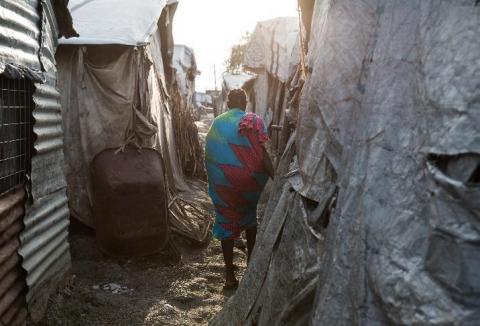The International Organization for Migration (IOM) said it undertook a large-scale study of knowledge, attitudes and practices (KAP) related to Gender-Based Violence (GBV) in South Sudan, in coordination with partners.
The organization said in a statement extended to Radio Tamazuj on Friday that Gender-Based Violence is endemic in South Sudan, where years of crisis have increased the vulnerability of women and girls, adding the scale of violence against women and girls in conflict and humanitarian settings is increasingly recognized as one of the most concerning human rights violations.
It further said the survey represents gathering of the first comprehensive data on GBV among internally displaced persons (IDPs), host communities and key populations in South Sudan to become widely available, pointing out that the survey collected baseline information about current knowledge, attitudes and practices regarding GBV and sexual health, gender norms, knowledge of and access to services.
“The study, which interviewed over 3,200 people, used quantitative and qualitative research, focusing on the experiences of women, girls and men, with a particular focus on populations of humanitarian concern and areas of high HIV prevalence in Central Equatoria, Eastern Equatoria, Unity, Upper Nile, Western Bahr el Ghazal and Western Equatoria states,” partly reads the statement.
IOM revealed that the results of its survey indicate a generally high level of awareness about the term GBV among the population. “Sadly, this may be due to a high occurrence of such activity. According to the survey, 48 per cent of female respondents reported a woman or girl in their household experiencing some form of GBV, just in the past 12 months,” the statement said.
“The findings of this survey offer us a major step forward in informing GBV prevention and response activities in South Sudan,” said IOM South Sudan Chief of Mission, William Barriga, at the validation workshop of the survey on 16 November. “Equipped with this, often disheartening information, stakeholders dedicated to GBV prevention and response efforts will be able to accelerate awareness activities and mobilize resources to help protect this country’s most vulnerable.”
The large-scale survey was supported by the Global Fund to Fight AIDS, Tuberculosis and Malaria through the UN Development Programme, and through coordination with the GBV Sub-Cluster, the South Sudan AIDS Commission and the South Sudan ministries of Health and Gender, Child and Social Affairs.




